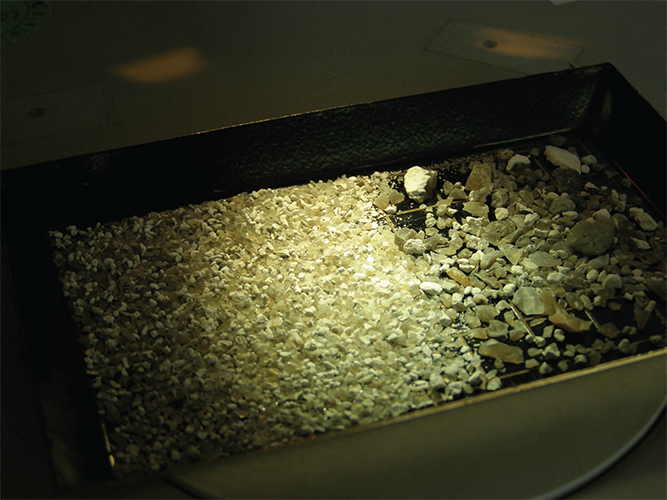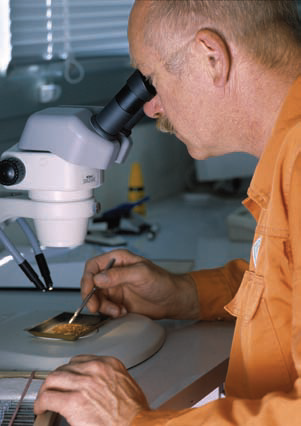
GEO-data
Breaking ground
Over the last eight years GEO-data has taken significant steps, catapulting it forward in the industry.
Established in 1978, it reached a major milestone in 1985, acquiring laboratory facilities from where it conducts among other things stable carbon isotope analysis. Monitoring of ground water, soil air, ground air and environmental conditions are undertaken in this facility, with a special focus today on unconventional wells and environmental related monitoring projects. The drive behind the business lays in oil and gas, unconventional drilling, geothermal and environmental consultancy.
 In 2011, GEO-data obtained a smaller company involved in core analysis. With growing interests in unconventional drilling the demand for typical analysis of normal types of rocks such as sandstone, or limestone is replaced by shales. Special machines and apparatus are required for low permeable rock types, and GEO-data is working towards analysis routines (e.g. GRI) for shale play evaluation. As well as heavy investment in machines it is increasing its capacity in the laboratory. “Our new laboratory will provide 600 sqm of additional space as we grow our activities in new fields.
In 2011, GEO-data obtained a smaller company involved in core analysis. With growing interests in unconventional drilling the demand for typical analysis of normal types of rocks such as sandstone, or limestone is replaced by shales. Special machines and apparatus are required for low permeable rock types, and GEO-data is working towards analysis routines (e.g. GRI) for shale play evaluation. As well as heavy investment in machines it is increasing its capacity in the laboratory. “Our new laboratory will provide 600 sqm of additional space as we grow our activities in new fields.
“We have an R&D department that drives technology forward. Significant developments have been made with the isotope technology and also with gas chromatograph technology utilising a flame ionization detector (FID), an instrument that measures the concentration of organic species in a gas stream. Particularly in the light of shale gas development, it provides a better understanding of the reservoir in terms of gas and its composition. We aim to make the chromatograph faster with more accurate to ten ppm or lower detection limits,” says Boris Nadolny, operations manager.
Over the last 18 months, there has been less activity in Germany due to environmental concerns as politics continue to play a major part in the development of fracking, both in the UK and Germany. “The climate for unconventional drilling is not very positive at present. This is however different in Poland, which is one of the main markets for unconventional drilling, and the leader in Europe. Some major players have recently ceased active drilling in Poland, but we have been able to increase our market share with companies such as Orlen, BNK and ConocoPhillips, one of the main drivers in shale gas exploration.
“Poland is still a big market, and we have up to ten units operational with our Polish partner, Geokrak. With them, we are providing gas canister desorption, which is needed for evaluation of shale gas resources. We are putting a lot of efforts in to new techniques, trying to increase our market share. As a partnership we are already the market leader in Europe for gas canister desorption,” announces Boris. Politically, the UK is in favour of shale gas development and is currently undertaking environmental assessment monitoring as Boris continues: “We have involvement in tendering processes for potential unconventional wells in the UK.
“Exxon, Wintershall, GdF Suez and RWE are still our main clients in Germany focused on conventional oil. We are working with three smaller clients, backed by larger organisations that are trying to redevelop old oil fields, revaluate seismic data and doing new 3D seismic calculations on sites that have decreased to zero production. The first phase of doing seismic reinterpretation for old wells has begun and there will be a lot of work if successful.” The business additionally has interests in Kazakhstan that have grown over the last 18 months. The region has large quantities of oil available and the focus is purely on conventional drilling.
“Two years ago we successfully entered Ukraine, establishing the branch Ukrgeodata LLP, based near Kiev. We are providing well site geologists for Shell, which is drilling in a mixture of both conventional and unconventional wells in the Kharkiv area. Our personnel are undertaking geological evaluation of the drilling process,” highlights Boris.
The size of the business has proved a valuable asset that its clients benefit from, as Boris says: “We are dedicated to our clients. When they need something they only need to make one call and decisions can be quickly reached. It is our advantage to be fast reacting. We have less of a presence in as many countries as larger companies, but in those countries we are focused on customer satisfaction. It isreinterpretation for old wells has begun and there will be a lot of work if successful.” The business additionally has interests in Kazakhstan that have grown over the last 18 months. The region has large quantities of oil available and the focus is purely on conventional drilling.
“Two years ago we successfully entered Ukraine, establishing the branch Ukrgeodata LLP, based near Kiev. We are providing well site geologists for Shell, which is drilling in a mixture of both conventional and unconventional wells in the Kharkiv area. Our personnel are undertaking geological evaluation of the drilling process,” highlights Boris.
The size of the business has proved a valuable asset that its clients benefit from, as Boris says: “We are dedicated to our clients. When they need something they only need to make one call and decisions can be quickly reached. It is our advantage to be fast reacting. We have less of a presence in as many countries as larger companies, but in those countries we are focused on customer satisfaction. It is important for personnel to remain up-to-date with technical aspects, and we value local geologists who know the areas, so employees in Poland, Germany, Ukraine and the UK are always of local origin. We have a training facility in Germany with a virtual mud-logging unit that focuses on mud-logging basics and advanced services like pressure evaluation, and geology as well as HSE. Many personnel are Master graded geologists, so much of our extensive training focus is on technical development.”
Looking ahead over the next 12 months GEO-data is set to increase efforts in the UK, Poland and Ukraine, consolidating interests and focusing on the offshore project it has commenced in Kazakhstan. “Our long-term outlook incorporates an expectation of more activity in east and west Europe with unconventional projects, and shareholder investment being made for this purpose. We are trying to bring the laboratory quality to the field, which is already established but we are putting a lot into improvement,” concludes Boris.
GEO-data
Services: Wellsite services, engineering, environmental laboratory and consulting